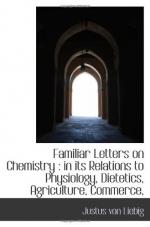When we consider the transformation of the albumen of the blood into a part of an organ composed of fibrine, the identity in composition of the two substances renders the change easily conceivable. Indeed we find the change of a dissolved substance into an insoluble organ of vitality, chemically speaking, natural and easily explained, on account of this very identity of composition. Hence the opinion is not unworthy of a closer investigation, that gelatine, when taken in the dissolved state, is again converted, in the body, into cellular tissue, membrane and cartilage; that it may serve for the reproduction of such parts of these tissues as have been wasted, and for their growth.
And when the powers of nutrition in the whole body are affected by a change of the health, then, even should the power of forming blood remain the same, the organic force by which the constituents of the blood are transformed into cellular tissue and membranes must necessarily be enfeebled by sickness. In the sick man, the intensity of the vital force, its power to produce metamorphoses, must be diminished as well in the stomach as in all other parts of the body. In this condition, the uniform experience of practical physicians shows that gelatinous matters in a dissolved state exercise a most decided influence on the state of the health. Given in a form adapted for assimilation, they serve to husband the vital force, just as may be done, in the case of the stomach, by due preparation of the food in general.
Brittleness in the bones of graminivorous animals is clearly owing to a weakness in those parts of the organism whose function it is to convert the constituents of the blood into cellular tissue and membrane; and if we can trust to the reports of physicians who have resided in the East, the Turkish women, in their diet of rice, and in the frequent use of enemata of strong soup, have united the conditions necessary for the formation both of cellular tissue and of fat.
LETTER XI
My dear Sir,
In the immense, yet limited expanse of the ocean, the animal and vegetable kingdoms are mutually dependent upon, and successive to each other. The animals obtain their constituent elements from the plants, and restore them to the water in their original form, when they again serve as nourishment to a new generation of plants.
The oxygen which marine animals withdraw in their respiration from the air, dissolved in sea water, is returned to the water by the vital processes of sea plants; that air is richer in oxygen than atmospheric air, containing 32 to 33 per cent. Oxygen, also, combines with the products of the putrefaction of dead animal bodies, changes their carbon into carbonic acid, their hydrogen into water, and their nitrogen assumes again the form of ammonia.
Thus we observe in the ocean a circulation takes place without the addition or subtraction of any element, unlimited in duration, although limited in extent, inasmuch as in a confined space the nourishment of plants exists in a limited quantity.




